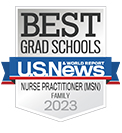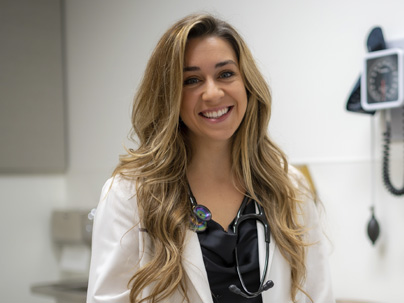The Master of Science — Family Nurse Practitioner Program is no longer available at the Betty Irene Moore School of Nursing. If you are interested in a FNP degree, please visit our Doctor of Nursing Practice — Family Nurse Practitioner Degree Program
Academics – Master of Science — Family Nurse Practitioner Degree Program
Welcome to the family nurse practitioner (FNP) program at the Betty Irene Moore School of Nursing at UC Davis
 The Betty Irene Moore School of Nursing at UC Davis is a new nursing school with a strong foundation of nursing education. Our interprofessional FNP program continues to prepare primary care providers for rural and underserved communities just as it did more than 45 years ago.
The Betty Irene Moore School of Nursing at UC Davis is a new nursing school with a strong foundation of nursing education. Our interprofessional FNP program continues to prepare primary care providers for rural and underserved communities just as it did more than 45 years ago.
Program features include:
- Faculty who partner with you and invest in your success
- Emphasis on leadership
- Dedication to inclusiveness
- High-tech simulation learning
- State-of-the-art facilities
- School-led clinical experiences
- No GRE or GMAT required
Mission and vision
The FNP program prepares graduates to deliver care as family nurse practitioners. In alignment with the school's vision to advance health, the mission of the family nurse practitioner program is to educate health care professionals to lead clinical programs in collaborative teams and to improve the availability of culturally relevant primary health care to underserved populations throughout California.
About the FNP profession

What do graduates have to say about the family nurse practitioner program?
Read and watch what 2016 alumna Samantha Gove says about her School of Nursing experience »
FNPs are registered nurses who are prepared, through advanced education and clinical training, to provide a wide range of preventive and acute health care services to individuals of all ages. They complete health histories and provide physical examinations, diagnose and treat many common acute and chronic problems, interpret laboratory results and X-rays, prescribe and manage medications and other therapies, provide health teaching and supportive counseling with an emphasis on prevention of illness and health maintenance, and refer patients to other health professionals as needed.
Preparing primary care providers
Programs at the School of Nursing prepare advanced practice nurses with both the knowledge and skills needed to serve in those capacities and meet the needs of a constantly changing health care system. Rooted in a growing body of research and nurtured by visionary faculty who seek to transform health care, the curricula embrace integrative case-based learning, technology and systems-wide perspectives. Instruction is also designed to be “more inspiring…and create an atmosphere of a community of learners,” as identified in a 2012 report by the President’s Council of Advisors on Science and Technology.
Jonathan Hernandez, R.N., Nurse Practitioner Student, Class of 2017
Because of health care reforms and an increasingly aging population with advanced chronic illnesses, millions more people require primary-care services, exceeding the number of providers currently available. The FNP program at the Betty Irene Moore School of Nursing provides a partial solution to this growing problem by educating and preparing primary care providers experienced in preventive measures, who advance health through health promotion and disease prevention, practice in ambulatory and community-based settings and enhance the existing workforce. A key to that preparation is learning in a collaborative environment, rather than in the absence of other health professions.
The FNP and physician assistant (P.A.) programs at the School of Nursing are the only ones in the country where students in these different disciplines learn alongside each other. Together, they discover how to interpret different perspectives, collaborate and lead as members of health care teams. The experience fosters awareness and appreciation of other cultures, promotes qualities that transcend the classroom and shapes how students provide care once in practice.
The FNP program is led by the Nursing Science and Health-Care Leadership Graduate Group, an interprofessional team of more than 55 faculty from disciplines including nursing, medicine, health informatics, nutrition, biostatistics, pharmacy, sociology and public health.
This full-time, professional degree program includes academic courses, clinical skills courses and supervised clinical practice. Academic courses provide a broad education that includes advanced skills in understanding complex problems and generating solutions, how health systems and health care work, how to improve quality, as well as how to lead teams and manage business aspects of care, including informatics and reimbursement. Together, students in the FNP and PA programs benefit from an enriched primary care curriculum, in-depth pharmacology curriculum and interprofessional preparation.
Graduates are prepared to work as leaders of health care teams and learn methods to continually critique and improve care, provide care that is evidence-based and establish systems of care to address population health issues. All students must complete core academic courses and a comprehensive exam as well as 720 hours of supervised clinical practice. Students spend a minimum of 540 hours in supervised clinical rotations in primary care and an additional 180 hours in supervised clinical rotations in other areas such as Pediatrics, Women’s Health, Mental Health, Emergency Medicine, Inpatient and Surgery. In addition, students spend a minimum of 270 hours practicing clinical skills through workshops, standardized patient encounters and simulation experiences.
Unique clinical opportunities in primary care
Unique clinical opportunities in primary care
The FNP program is a 24-month, year-round program. Core courses are offered summer, fall, winter and spring quarters on the UC Davis Sacramento campus. Students typically attend class Monday through Friday and they should also expect some weekend and evening course requirements and clinical experiences.
First-year students are in class approximately four days per week, from 8 a.m. to 5 p.m. This schedule is subject to change.
Second-year students complete several, 4-to-6-week-long clinical rotations throughout California. The school arranges the rotations, although students may make requests. Students return to campus for a week at least once per quarter for coursework related to clinical skills, leadership and quality improvement. Read more about the FNP program's courses.
A mandatory Leadership Immersion Experience serves as an orientation for students. This full-time, three-day experience runs the week prior to the first summer quarter. Throughout their time together, students interact with School of Nursing leadership, participate in team building and develop one-on-one faculty relationships. The Leadership Immersion Experience serves as the foundation for the Nursing Science and Health-Care Leadership Graduate program curriculum.
- Full-time enrollment (at least 12 units per quarter) is required
- Required courses for the master’s-degree program include a combination of core courses and electives.
- A comprehensive exam is required.
- Family nurse practitioner degree program students are expected to complete the program in 24 months.
- Family nurse practitioner program degree requirements
- Essential abilities and technical standards for students






